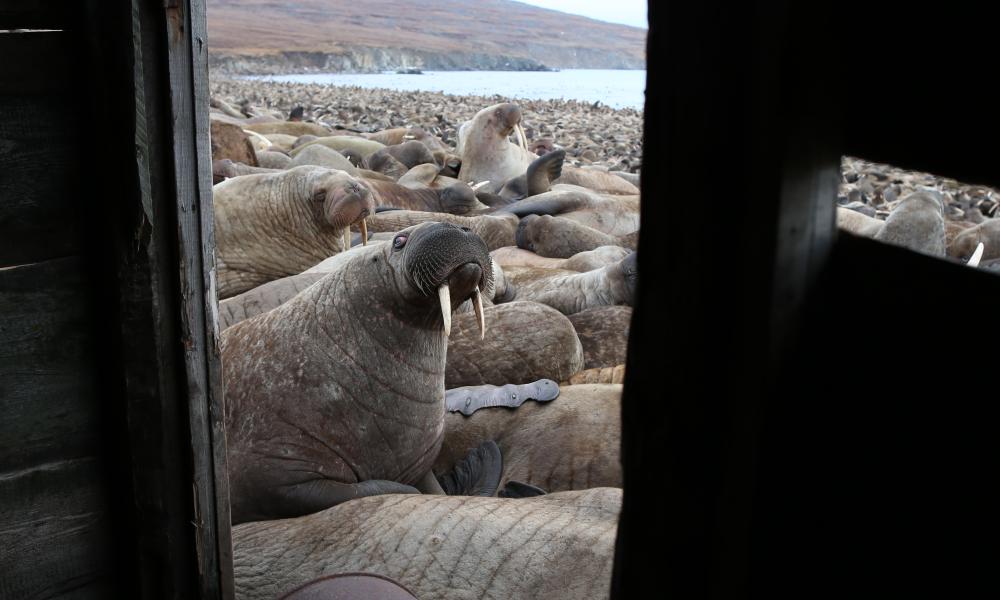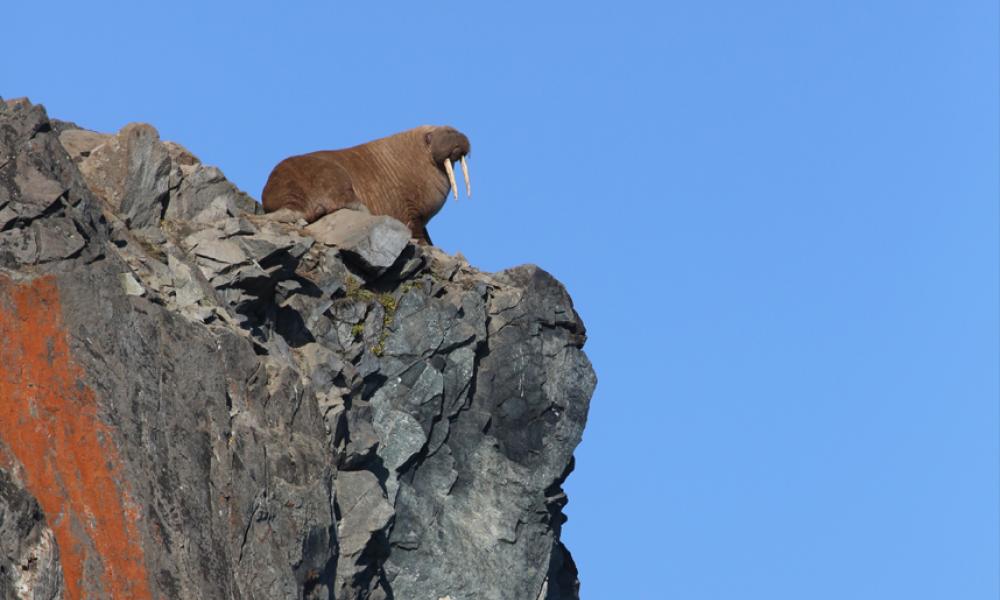David Attenborough's”
Our Planet”
It is Easter here, so I had an opportunity to watch the first 2 episodes of Netflix's “Our Planet”, narrated by David Attenborough.
Netflixis accused of 'eco-tragedy porn' in new Attenborough documentary featuring walruses falling to their deaths 'because of climate change' after zoologist claims they were being CHASED by polar bears'
https://wattsupwiththat.com/2019/04/07/attenboroughs-tragedy-porn-of-walruses-plunging-to-their-deaths-because-of-climate-change-is-contrived-nonsense/
Village besieged by polar bears as hundreds of terrorised walruses fall 38 metres to their deaths
Just looking with a fairly untrained eye it did not look at all as if the walruses were trying to get away from polar bears (and what were they doing on the cliff?). They looked as if they were trying to get down but lost the struggle to get back up the scree slope.
The following article from the person who made the film makes it clear that they had expert advice from a Russian expert, Anatoly Kochnev, on walruses who has been witnessing the disapearance of the ice over time.

See this article - Bear is no game
Arctic
wildlife captured by photographer and polar scientist Anatoly Kochnev
His Russian language blog is HERE
The Disturbing Walrus Scene in Our Planet

1. HOW DID YOU FILM THIS SEQUENCE?

Our Planet”
It is Easter here, so I had an opportunity to watch the first 2 episodes of Netflix's “Our Planet”, narrated by David Attenborough.
It
is as good as any of his previous series although I have atrong
aversion to the modern photography which seems anything but real to
me.
I
watched the second episode carefully, especially the controversial
scene of the walruses falling to their deaths off a cliff.
There have been some pretty loud headlines around the world proclaiming that the scene was "fake" that has naturally been picked up by the climate change denial community.
https://wattsupwiththat.com/2019/04/07/attenboroughs-tragedy-porn-of-walruses-plunging-to-their-deaths-because-of-climate-change-is-contrived-nonsense/
The denier article refers back to a "fake" video of a starving polar bear in 2017 while the Daily Mail cites an article from the pretty credible Siberian Times.
Village besieged by polar bears as hundreds of terrorised walruses fall 38 metres to their deaths
The following article from the person who made the film makes it clear that they had expert advice from a Russian expert, Anatoly Kochnev, on walruses who has been witnessing the disapearance of the ice over time.

See this article - Bear is no game
His Russian language blog is HERE
A
shocking sequence shows the huge mammals scaling steep cliffs, then
falling to their death.
HEAR
FROM SOPHIE LANFEAR, DIRECTOR OF THE OUR PLANET FROZEN EPISODE
1. HOW DID YOU FILM THIS SEQUENCE?
Filming
these sorts of scenes is never easy and this was a particularly
emotional one.
Walruses
as you can imagine are frightened of people, something that we were
exceptionally mindful of when filming them. When approaching the
walruses we made sure we were downwind of them and that we could not
be seen. We only stood up when it was safe to do so and when we
weren't at risk of scaring any walrus. Sometimes that meant crawling
in on our bellies and using whatever cover we could find to hide
ourselves. It could take over an hour for us to get in position, but
it was worth it to have peace of mind that we were not disturbing the
walrus by approaching slowly and extremely cautiously.
2.
DID YOU TAKE ANY SPECIAL MEASURES TO MAKE SURE YOU DIDN’T DISTURB
THE ANIMALS?
We
had a scientist with us at all times (Anatoly Kochnev, Russian
Academy of Sciences, whose work studying walrus behaviour in Russia
is supported by WWF) monitoring us and making sure that we did not
disturb the walruses. If on occasion Anatoly could not be with us,
then he provided us with one of his trusted field biologists who were
also there to study the walrus.
Before
filming, Anatoly briefed us on how to behave around walrus and we
agreed that we would only position ourselves where he thought we
would not disturb the walrus. Anatoly specified the best/safest spots
to film from and we adhered to his instruction. At the cliff site, we
did not get closer than about 50m to the walrus. At the mass haul out
site, where the walrus surrounded the cabin, we only attempted to
film outside the cabin when Anatoly deemed it safe to do so and he
monitored us at all times and limited how long we could be outside
the cabin. The walruses were inquisitive of us but we were extremely
careful when moving, doing so very slowly and careful not to break
the "line" of the cabin.
3.
WHY DID THE WALRUS CLIMB THE CLIFFS? AND WHY DID THEY THROW
THEMSELVES OFF IT?
The
exact reasons behind why walrus climb cliffs is hard to pin down,
however we saw walrus climb up when there was no more space on the
beach below. Once the area below the cliffs was full, they spread out
around and eventually up the cliffs and the majority were unable to
find their way safely down, with tragic consequences.
It
is important to remember the long-term context of this situation.
Anatoly has been monitoring these Russian coastal sites for 35 years.
These long-term observations reveal that in recent years (especially
the last 10 years) walrus are coming ashore to rest much more
frequently now than they did in the past and at some sites, in much
larger numbers and especially females with their calves. This is
because of sea ice loss, which is caused by climate change. It is
important to note, that this research pertains to pacific walrus,
which are the ones we filmed for the sequence.
***
I don't find it difficult to accept that filmakers such as Netflix could fake things to make a point. However, in this case I beg to differ.
So, the question has to be asked if the voice of a Russian academic is to be ignored in this.
I have great admiration for David Attenborough and am pleased that this message is being put out. I can understand the sentiment but the evidence points, not to an ice-free Arctic by 2040 but long before that.
All of that makes the following from Attenborough meaningless sentiment:
***
I don't find it difficult to accept that filmakers such as Netflix could fake things to make a point. However, in this case I beg to differ.
So, the question has to be asked if the voice of a Russian academic is to be ignored in this.
I have great admiration for David Attenborough and am pleased that this message is being put out. I can understand the sentiment but the evidence points, not to an ice-free Arctic by 2040 but long before that.
All of that makes the following from Attenborough meaningless sentiment:
“We can still stabilize our planet once more, but there is not much time. It will require significant global cooperation on issues like population growth, climate change and management of the oceans
“We will need to confront difficult questions like meat consumption and the point of new technologies. For any of this to succeed, we will need most people on earth to understand the challenges and see the value in taking action.”




No comments:
Post a Comment
Note: only a member of this blog may post a comment.